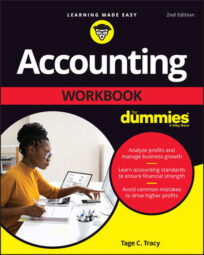The effect that making a sale has on a business’s financial condition depends on the type of sales transaction that's made — that is, when the cash is collected from the sale When a business sells a product or service, cash may be collected at the time of the sale (called a cash sale), after the sale (on credit), or before the sale (an advance payment).
One of the most quoted sayings in business is, “Nothing happens until you sell it.” Well, there’s no doubt that a business has to make sales that generate enough sales revenue to overcome its expenses and leave a residual of profit.
Regarding cash collection, sales come in three flavors:
Cash sales: Cash is collected when the business makes the sale and delivers the product and/or service to the customer.
Credit sales: Cash isn’t collected until sometime after the sale is made; the customer is given a period of time before it has to pay the business.
Advance payment sales: The customer pays the business before the sale is consummated, that is, before the business delivers the product and/or service to the customer.
No doubt you’re familiar with cash and credit sales. For the third type of sale, at the time of receiving an advance payment, the business does not record a sale; instead, it records a liability that stays on the books until the product or service is actually delivered to the customer. This specific liability is one of the business’s operating liabilities.
For example, paying for an annual subscription to a newspaper is considered an advance payment for delivery of the newspaper every day for the coming 12 months. Similarly, if you want to purchase season tickets for your favorite NFL football team, you would need to make an advance payment, before the season starts. A gift certificate is another example of an advance payment sale. The liability of the advance payment sale is extinguished as papers are delivered, games are played, and gift certificates are redeemed.
If a business recorded $3,200,000 in sales revenue for the year just ended, can you tell how its balance sheet changed as the result of that sales revenue? No, you can’t — unless the business makes only cash sales. If the business makes credit sales or collects advance payments from customers for future sales, then the changes in its balance sheet caused by sales are a little more involved.

